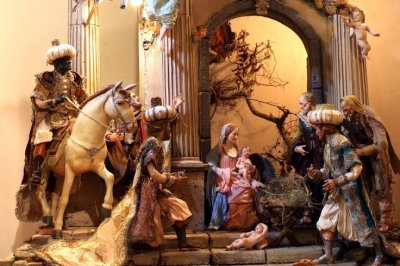My favorite part of the Christmas story

Hands down, my favorite narrative that’s always included in the story of Jesus’ birth deals with the magi. You find it in the first 12 verses of Matthew 2.
The first thing to understand about the account is that it did not occur on the night of Jesus’ birth, no matter how many times you’ve seen nativity scenes depicting the magi present. Their entry into Christ’s life occurred quite a while later, most likely when Jesus was a very young child.
Regardless of when they arrived, the color and meaning they add to the person of Jesus are very powerful, which is why Matthew included them in his biography of Christ.
Here come the heavyweights
Who were the magi? In short, they were kingmakers.
The ancient historian Herodotus tells us the magi originated from the Medes and functioned as priests in their pagan rituals. From the Babylonian to the Roman empires, the magi were revered and held a place of tremendous significance in the Orient.
They became the key people in ancient governments and during the four world empires, the magi served in a powerfully influential capacity as advisors to the royalty in the East, consequently earning the reputation of being “wise men.”
The law of the Medes and Persians (Est. 1:19; Dan. 6:8) was the code of scientific and religious discipline of the magi, and it was required instruction for anyone wishing to be a monarch in Persia. No Persian was able to become king until they mastered the scientific and religious discipline of the magi; only then could they be crowned by them.
In addition to overseeing the kingly office, the magi ran the judicial branch of government as well (Est. 1:13 implies that the royal bench of judges was chosen from the magi). With this kind of leverage, the magi of the massive Medo-Persian Empire were able to control essentially the entire known world of the Orient.
Any wonder why Herod soiled his fruit-of-the-looms when these guys showed up one day to crown someone they called “the king of the Jews”?
Shock and awe
Rome was scared silly of the magi and their eastern empire and, at the time of Christ, there was a ruling body called the Megistanes, similar in function to the United States Senate. It was composed of magi who had the absolute right of choice to select a king.
The magi had problems with their current ruler who had been deposed and, wanting to fight Rome with a new monarch, they were on the hunt for a new king for the eastern empire. With Rome’s current leadership in doubt at the time, the Parthians were aware that this would be the ideal time to bring about an eastern war against the west.
So here came the magi down Main street in Jerusalem, seeking their new king — one whom Bible scholars say they had learned about from the prophet Daniel.
Our common representation of the magi arriving on three camels is a far cry from reality. Instead, they were more in number and likely traveling in full force with all their oriental pageantry, riding Persian steeds rather than camels. And with them, historians estimate there could have been about a thousand mounted Persian cavalrymen acting as bodyguards.
That’s some serious shock and awe!
No doubt this is why Matthew says, “When Herod the king heard this, he was troubled, and all Jerusalem with him” (Matt. 2:3). The Greek word for “troubled” is tarassó, which conveys a violent shaking and turmoil.
One can only imagine Herod’s expression — the man who was granted the exact title “king of the Jews” years earlier by Anthony and Octavian — looking out at the magi who had come to crown the king of the Jews.
The head game the magi were playing with Herod ran its course and concluded when they located Jesus who, Matthew tells us, they worshipped (2:11), indicating that their mission may not have been purely political. The Bible doesn’t tell us anything more about the magi’s purpose in the life of Christ other than they headed back to their country, tricking Herod who attempted to find and murder the future king by killing all the male children 2 years old and younger in the Bethlehem region.
Isn’t it interesting to note that some of the first people in the world to recognize the arrival of the Jewish King of kings were Gentiles and not Jews? Perhaps it’s a subtle statement about Jesus uniting both in His church body. Plus, it may also speak to the upcoming rejection of Him that John records: “He came unto His own, and His own received Him not” (1:11).
In any event, while Israel and Rome may have done their best to stop Christ from being King, God declared His Son's royal presence by bringing the mighty kingmakers, the magi, from Persia to acknowledge it.
The story of the magi is a powerful reminder that not only is Jesus Savior, but He is King overall as well – something referenced in a stanza contained in John Henry Hopkins' famous Christmas carol, We Three Kings:
Born a King on Bethlehem's plane
Gold I bring to crown Him again
King forever, ceasing never
Over us all to reign
Robin Schumacher is an accomplished software executive and Christian apologist who has written many articles, authored and contributed to several Christian books, appeared on nationally syndicated radio programs, and presented at apologetic events. He holds a BS in Business, Master's in Christian apologetics and a Ph.D. in New Testament. His latest book is, A Confident Faith: Winning people to Christ with the apologetics of the Apostle Paul.




























